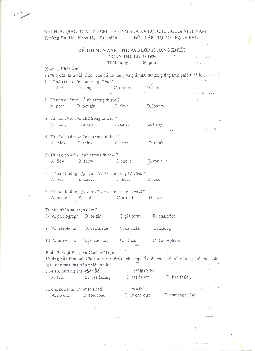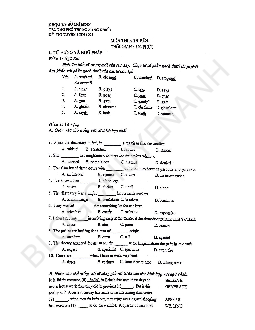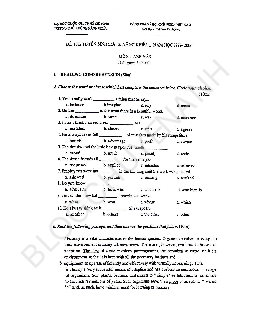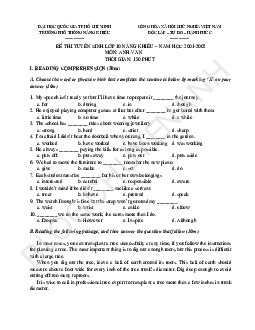






Preview text:
Sở Giáo dục và Đào tạo Thái Nguyên
Môn thi: Tiếng anh
Kỳ thi tuyển sinh lớp 10 THPT Chuyên
(dành cho thí sinh thi vào chuyên tiếng Anh)
năm học 2014 - 2015 Ngày thi: 30/6/2014
Thời gian làm bài: 150 phút (không kể thời gian giao đề)
Đáp án đề chính thức
Mỗi câu đúng được 1/100 điểm Điểm Giám khảo số 1 Giám khảo số 2 Số phách (họ tên, chữ ký) (họ tên, chữ ký) (do chủ tịch HĐ ghi) Bằng số Bằng chữ
Bài thi này gồm cú 6 trang được đánh số từ 1 - 6. Thí sinh kiểm tra số tờ bài thi trước khi làm bài. SECTION A. PHONETICS
Choose the word which has the underlined part pronounced differently from that of the others.
Example: 00. A. man B. bad C. many D. manage
Answer: 00. C 01. A. dead B. bread C. thread D. bead 02. A. needed B. naked C. sacred D. walked 03. A. check B. channel C. character D. change 04. A. environment B. government C. comment D. development 05. A. cough B. plough C. weigh D. though 01. D 02. D 03. C 04. C 05. A
SECTION B. GRAMMAR AND VOCABULARY
I. Choose the correct answer A, B, C or D.
06. We spent ______ day sunbathing with our family. A. whole B. all the C. the whole D. whole of the
07. It says in the program that the concert _______ at 10:20. A. will finish B. has finished C. finishes D. finished
08. She’s very _______ and loves looking after babies and toddlers. A. motherly B. mother C. mothering D. motherhood
09. Dress warmly _______ you’ll catch cold. A. on the contrary B. or else C. or rather D. in no way
10. The new system didn’t _______ expectations. A. catch up with B. bring about C. come across D. come up to
11. Before the meeting finished, they had arranged when _______ next. A. they met B. they to meet C. to meet D. should they meet
12. We were so late that we _______ had time to catch the train. A. nearly B. almost C. hardly D. simply 1
13. _______ my friends knew I was going to study overseas. A. Not much of B. Not many of C. Not a lot D. Not many
14. It was getting so cold that she had to ______ the sweater. A. dress in B. put on C. try on D. wear over
15. The Smiths never go out in the evening, _________ ? A. do they B. don’t they C. doesn’t he D. does he
16. Doctors advised ______ too many hours watching television. A. not to spend B. not being spend C. not spend D. not spending
17. Can you give me the ______ for tomato soup? A. formula B. recipe C. order D. method
18. You should pay ______ to what the instructor is saying. A. attendance B. intention C. convertion D. attention 06. C 07. C 08. A 09. B 10. D 11. C 12. C 13. B 14. B 15. A 16. D 17. B 18. D
II. Use the word given in CAPITALS at the end of each line to form a word that fits the
space in the same line. There is an example for you (0).
The clothes we wear can be a form of 0.
(0)__COMMUNICATION__. Clothes, like a (19) _______ language, COMMUNICATE
give out a message. This can be very simple, for example, when we wear 19. SPEAK
clothing for keeping warm, or perhaps to attend a (20) ____________
ceremony, announce our (21) _______ views or just look sexy, it
isn’t always this simple, however, (22)_______ , as with speech, our 20. GRADUATE
reasons for making any statement have a (23) _______ to be double or 21. POLITICS
multiple. The man who buys an expensive coat may simultaneously want 22. FORTUNE
it to offer (24) ______ from bad weather, and magically surround him 23. TEND
with the qualities of a(n) (25)______ film star. (26) _______ , people
rarely succeed in satisfying both these requirements at once. Even 24. PROTECT
(27)_______ both these could actually be made by one single coat, this 25. NATION
(28) _____ item of clothing may not be available, and if it is, we may not 26. NATURE be able to afford it. 27. SUPPOSE 28. IDEA 19. spoken 20. graduation 21. political 22. unfortunately 23. tendency 24. protection 25. international 26. Naturally 27. supposing 28. ideal
III. Complete each of the following sentences with one of the phrasal verbs given below. Make any necessary changes. hold back call off catch on
put (someone) through to break up give out pay off bring (someone) around
29. They had to _______ the football match because of the weather.
30. We managed to _______ by splashing his face with water. 2
31. Could you _______ the manager, please?
32. The film was so sad that she couldn’t _______ her tears.
33. Ten employees were _______ as there wasn’t enough work for all.
34. The school _______ for the holidays at the end of May.
35. The students were slow to _______ , but gradually they began to understand.
36. The names of the winners were _______ on the radio. 29. call off 30. bring him around
31. put (me) through to 32. hold back 33. paid off 34. broke up 35. catch on 36. given out
IV. Fill in each numbered blank with a suitable preposition.
Let children learn to judge their own work. A child learning to talk does not learn (37)
____ being corrected all the time: if corrected too much, he will stop talking. He notices a
thousand times a day the difference (38) ____ the language he uses and the language those
around him use. Bit (39) ___ bit, he makes the necessary changes to make his language (40)
_____ other people’s. In the same way, children learning to do all the other things they learn to
do (41) ____ being taught – to walk, run, climb, whistle, ride a bike – compare their own
performances (42)____ those of more skilled people and slowly make the needed changes. But
in school we never give a child a chance to find out his mistakes (43) ____ himself, let alone
correct them. We do it all for him. We act as if we thought that we would never notice a
mistake unless it was pointed (44) ___ to him or correct it unless he was made to. Soon he
became dependent on the teacher. Let him do it himself. Let him work out, with the help of
other children if he wants it, what this word says, what the answer is to that problem, whether
this is a good way of saying or doing this or not. 37. by 38. between 39. by 40. like 41. without 42. with 43. for 44. out SECTION C. READING
I. Read the passage and decided which answer (A, B, C, or D) best fits each blank.
If you are having problems with a difficult boss, first of all you need to talk to her. She may
not know you are having trouble. By (45)_____ such a meeting while suppressing your
feelings, you could be come across as an irrational person while you finally confront her. No
one, least (46)____ all management, wants to listen to hysterical (47)_____ .
Before you speak to your supervisor, prepare your (48)_____ . Make sure your requests are
(49)_____. For example, if you want a bigger office, find out whether one is actually available.
Are your expectations realistic? Try to (50)_____ any objections your boss may (51)_____
.Think positive. Go over the meeting in your mind and predict how your boss will (52)_____.
Plan how you’ll deal with negative responses, so you can (53)_____ a positive attitude overall.
Be very specific about what you want. For example, “better communication” is not a clear
(54)_____. Neither is merely warning a pay raise. If you ask for a raise and your boss says yes,
you may wind up with $ 1.50 more a week. A little background is probably necessary to frame
your problem, but don’t get carried away with long- winded speeches. 45. A. postponing B. interrupting C. wiping D. obtaining 46. A. over B. on C. of D. towards 47. A. praise B. complaints C. resistances D. disgusts 3 48. A. viewpoint B. approach C. manner D. claim 49. A. virtual B. specialized C. obvious D. valid 50. A. suppose B. indicate C. measure D. anticipate 51. A. make up B. bring up C. bring about D. make out 52. A. oppose B. reveal C. react D. present 53. A. maintain B. remain C. contain D. render 54. A. requirement B. opinion C. argument D. objective 45. A 46. C 47. B 48. B 49. D 50. D 51. B 52. C 53. A 54. D
II. Fill in each numbered blank ONE suitable word. HOME STAY
When studying a foreign language abroad, a large majority of students choose ‘homestay’
accommodation, living with a (55) _____ family while they attend classes in a nearby language
school. Very (56)_____ , however, once lessons have finished, students speak their mother tongue
with other class members of the same nationality. On a Home Stay Language International study
trip, we ensure total immersion in the target language environment by arranging accommodation
and one-by-one tuition in your teacher’s home, so that you (57)_____ surrounded by the language
during every moment of your stay.
As you are the only student, you can learn (58)_____ your own pace, and the lessons are
made to suit your individual interests and objectives. You will also have the chance to
(59)_____ fully in your host teacher’s activities, including trips to places of (60)_____ in the
local area. All of our teachers have a university degree and a relevant (61)_____ qualification,
and most have spent much time abroad and they can understand the needs and concerns of their
(62)____ guests. Home Stay Language International offers a wide range of general or business
courses for young and old (63)_____ , with a choice of over 80 destinations throughout the
world. Whether it’s English in New Zealand, French in Canada or German in Austria, you can
expect a (64) _____ welcome in a relaxed home environment and an unforgettable study experience. 55. host 56. often 57. are 58. at 59. participate 60. interest 61. teaching 62. student 63. alike 64. warm
III. Read the text below and look carefully at each line. Some of the lines are correct, and
some have a word which should not be there. If a line is correct, put a tick (√) at the end
of the line. If a line has a word that should not be there, write the word at the end of the line. Finding a Pen-Friend
0 The Pen-Pal scheme makes up every effort to match 0 ........up............... 00 individuals
00 ........√................
65 in different countries. Only on rare occasions have we
65.............. in ......... 4
66 failed to find clients pen-pals. If you are interested in you
66................√........... 67 should
67.................if.........
68 fill in the form asking for details about yourself. We need to 68................To........
69 know the hobbies and sports you like as only if then
69.................√.........
70 can we match you with a suitable partner. To tell us
70..................a........
71 which subjects you like doing at school and if you have
71...............with.....
72 any requirements as far as a food is concerned. Most pen-pals
72...............will.......
73 end up with exchanging visits and it is vital that you feel
73...............out........
74 at ease when you will visit each other. We do our best to
74.................√.........
75 avoid obvious clashes. Before you make out your
75...............they......
76 choice of pen-pal make sure you have looked at several
76...............will......
77 possible partners; someone they may make a very good
77..................√........
impression on you until you will have seen the other pen
pals so take your time before you make up your mind.
IV. Read the following passage and choose the correct answer to each question.
Sometimes it’s hard to figure out if you have a food allergy, since it can show up so
many different ways. Your symptoms could be caused by many other problems. You may have
rashes, hives, joint pains mimicking arthritis, headaches, irritability, or depression. The most
common food allergies are to milk, eggs, seafood, wheat, nuts, seeds, chocolate, oranges and
tomatoes. Many of these allergies will not develop if these foods are not fed to an infant until
her or his intestines mature at around seven months. Breast milk also tend to be protective.
Migraines can be set off by food containing tyramine, phenathylamine, monosodium glutamate,
or sodium nitrate. Common foods which contain these are chocolate, aged cheese, sour cream,
red wine, pickled herring, chicken livers, avocados, ripe bananas, cured meats, many Oriental
and prepared foods. Some people have been successful in treating their migraines with
supplements of B-vitamins, particularly B6 and niacin. Children who are hyperactive may
benefit from eliminating food additives especially colorings, and foods high in salicylates from
their diets. A few of these are almonds, green peppers, peaches, tea, grapes. This is the diet
made popular by Benjamin Feingold, who has written the book Why Your Child is
Hyperactive. Other researchers have had mixed results when testing whether the diet is effective.
78. The topic of this passage is ______ . A. reactions to foods B. food and nutrition C. infants and allergies D. a good diet
79. According to the passage, the difficulties in diagnozing allergies to foods is due to _____ .
A. the vast number of different foods we eat
B. lack of a proper treatment plan
C. the similarity of symptoms of the allergy to other problems
D. the use of prepared formula to feed babies
80. The word “symptoms” in the passage is closest in meaning to ______ . A. indication s B. diet C. diagnosis D. prescriptions
81. What can be inferred about babies from this passage? 5
A. They can eat almost anything.
B. They should have a carefully restricted diet as infants.
C. They gain little benefit from being breast fed.
D. They may become hyperacive if fed solid food too early.
82. The word “hyperactive” in the passage is closest in meaning to _____ . A. overly active
B. unusually low activity C. excited D. inquisitive
83. The author states that the reason that infants need to avoid certain foods related to allergies
has to do with the infant’s _____ . A. lack of teeth B. poor metabolism
C. underdeveloped intestinal tract
D. inability to swallow solid foods
84. According to the article the Feingold diet is NOT ____ .
A. verified by researchers as being consistently effective B. available in book form
C. beneficial for hyperactive children
D. designed to eliminate foods containing certain food additives 78. A 79. C 80. A 81. B 82. A 83. C 84. A
V. Read the following passage and choose the most suitable sentences from the list A – I
for each gap from (85 – 90). There are two extra sentences that you do not need to use.
A. For example, in the 1950s, young people around the world dressed like Elvis Presley.
B. They usually like the same type of music and wear the same style of clothing.
C. The truth is most people don’t want to look unfashionable.
D. The British Queen Elizabeth was famous for her fashionable clothes.
E. However, it can also explain what you think.
F. There are adverts everywhere: on TV, on the Internet and in magazines.
G. The French King Louis XIV was famous for his elegant style.
H. Some people say they don’t care what they wear.
I. Fashion is the most important thing that young people think of every day. The Power Of Fashion
Fashion is something we think about every day (0)..H... . But they still choose clothes
every morning that say a lot about them and how they feel. (85) _____ . They want to wear up-
to-date clothes that make them feel good. The problem is fashion is always changing.
During the 18th century, Paris was the centre of the fashion industry and, like today, the
fashion changed. (86)_____ . He wanted other countries to know about Paris fashions, so he
sent fashion dolls to Europe. Dressmakers could then copy the clothes, footwear and hats on the dolls.
In recent years, music, films, videos, books and TV have all influenced what people
wear. (87)_____ . Then in the 1990s, hip hop was very popular and young people dressed in
baggy trousers and hooded tops and boots. Ray-Ban sold thousands of pairs of sunglasses after
Will Smith wore them in the film Men In Black. If he’d worn a different type of sunglasses,
they would have become popular instead.
Young people often choose their clothes in order to be part of a group. The members of
the group have the same interests, and have names such as goths, skaters or rappers. (88)_____.
If a young person is a goth, for example, they wear black clothes. If somebody is a rapper, they 6
often wear baggy jeans and lots of jewellery.
Style can show what kind of music you like, or what group you belong to. (89)_____. In
the 1970s, people wore badges to show what they thought about important issues. In the 1990s,
Katherine Hamnett, a top British fashion designer, became popular when her T-shirts with
messages such as “Preserve the rainforests” were worn by different rock bands. In 2005, people
at the Live 8 concerts wore white wrist-bands with the message “Make poverty history”.
The truth is the fashion industry is huge. Millions of people around the world are
involved in the buying, selling and production of clothing. Of course, advertising is important
too. (90)_____ . However, if the media didn’t exist, fashion would still change - just like it did in the day of Louis XIV. 85. C 86. G 87. A 88. B 89. E 90. F SECTION D. WRITING
I. Finish the second sentence in such a way that it has the same meaning as the one printed before it.
91. People always laugh at his face, and he dislikes it.
He hates people laughing at his face/ He hates being laughed at his face.
92. I left without saying goodbye as I didn’t want to disturb the meeting.
Rather than disturb the meeting, I left without saying goodbye./ Rather than disturbing
the meeting, did I leave without saying goodbye.
93. You don’t find such exquisite hand-made suits in many shops here.
In few shops here do you find such exquisite hand-made suits.
94. His insistence on dropping out of the race at the last minute came as no shock to everybody.
He insisted on dropping out of the race at the last minutes, which came as no shock to everybody.
95. The realization of what she had sacrificed for him led him to believe she was all the world to him.
Not until he realized what she had sacrificed for him did he believe she was all the world to him.
II. Complete the second sentence in a way that it means the same as the previous one,
using the word given. Do not change the word given. Do not use more than FIVE words.
96. Minh had not been to London before. (VISIT)
It was Minh’s first visit to London.
97. Nobody apart from my mother thought I would win the race. (PERSON)
My mother was the only/ one person who/ that thought I would win the race.
98. “You’ve broken my radio, David!” said Jane. (ACCUSED)
Jane accused David of breaking/ having broken her radio.
99. I thought I might run out of cash, so I took my cheque-book with me. (CASE )
I took my cheque-book with me in case I ran out of cash.
100. Mark has been completely unsuccessful with his enquiries. (NO)
Mark has made no effort to improve at all with his enquiries. The end
Total mark: 100: 10 = 10 7




